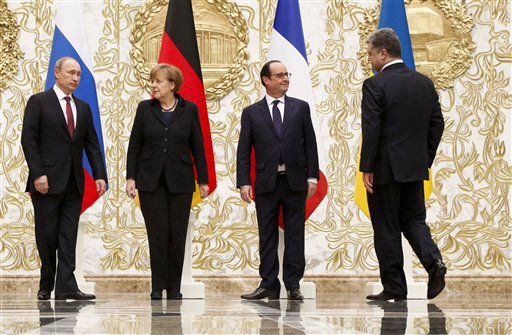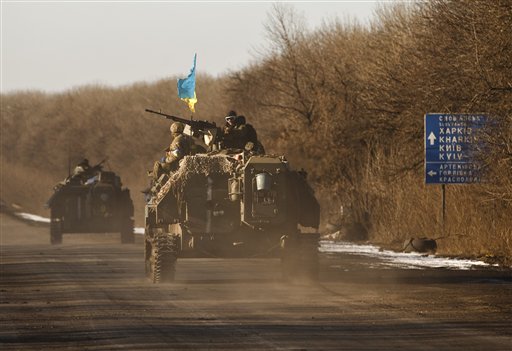The Ukrainian crisis: can we accurately define it?

From the left : Russian President Vladimir Putin, German Chancellor Angela Merkel, French President Francois Hollande, and Ukrainian President Petro Poroshenko arrive to pose for a photo during a time-break in their peace talks in Minsk, Belarus, Wednesday, Feb. 11, 2015. Leaders of Russia, Ukraine, France and Germany are gathering for crucial talks in the hope of negotiating an end fighting between Russia-backed separatist and government forces in eastern Ukraine. (AP Photo/Alexander Zemlianichenko)
March 2, 2015
If there was ever a word that could accurately sum up the political landscape of Europe today, it seems “stagnant” is a good candidate. “Turbulent” falls not too far behind.
From the night of February 11th into the morning of the 12th, a peace deal over the fighting in Ukraine was reached between Russian President Vladimir Putin, who represented the separatist rebels, and German Chancellor Angela Merkel, French President Francois Hollande and Ukrainian President Petro Poroshenko, all of which represented the Ukrainian loyalists and the UN.
The deal was designed to de-escalate the fighting in Eastern Ukraine, where a bloody battle has been waged for almost a year between pro-Russian rebels that wish to capture a chunk of the country for Russian annexation, and the Ukrainian sovereignty. Both parties agreed to remove heavy weapons from within 40 miles of the front.
Apparently, not everyone got the memo.
In the week following the attacks, fourteen Ukrainian soldiers were killed and another 173 wounded by pro-Russian rebels. Reports stated the city of Debaltseve lied in ruin, and the loyalists troops had been forced back from the area. Of the 45,000 that once called Debaltseve home, reports say only about 6,000 remain.
President Poroshenko has been pleading for some support from the intergovernmental organization OSCE, or Organization for Security and Cooperation in Europe, about enforcing the terms of the ceasefire. Poroshenko also has proposed that the UN deploy peacekeepers to the area to help stymie the conflict, much to the angst of Russia.
This situation is one that the United States needs to monitor very closely. Before the agreement for peace on the 12th, President Obama was preparing to send defensive weapons in aid of the Ukraine. He is still contemplating the possibility if the peace agreement is not kept.
“If, in fact, diplomacy fails, what I’ve asked my team to do is to look at all options,” Mr. Obama said. “What other means can we put in place to change Mr. Putin’s calculus? And the possibility of lethal defensive weapons is one of those options that’s being examined.”
The first week following the agreement had been anything but peaceful for eastern Ukraine, and on Saturday shelling from the East injured 34 Ukrainian soldiers and killed a journalist, Mr. Serhiy Nikolayev. Yesterday marked the first day there has been no shelling on either side of the front.
Andriy Lysenko, a Ukraine National Security and Defence Council spokesman, worries that the ceasefire is only being honored now so that separatists can regroup.
“In order to mislead OSCE representatives, the rebels are moving military equipment from the front line … and bringing it back at night,” Lysenko said. “There are signs the enemy is preparing for further offensives.”
Lysenko named some possible targets for future attacks, such as government-held Mariupol, a strategic port city; and Artemivsk, north of the rebel stronghold of Donetsk.
The ramifications for what is going on in the Ukraine goes beyond a strip of land here or a power structure there. NATO allies in the region, such as Latvia and Lithuania, worry that they could suffer the same destabilization that the Ukraine has in an attempt at a land grab by Russia.

A guiding principle for NATO’s 28 member countries is “an attack against one is an attack against all,” which would require a US response militarily if one is attacked.
With tensions between the West and Russia reaching Cold War-esque levels, something has to be done sooner rather than later. Given the failed diplomacy, and the threat of sanctions becoming an ineffective deterrent, perhaps a stronger response is required.
Putin has muscled his way into the Ukraine at the behest of the West. The sanctions deployed against his country, while effective in weakening the Russian economy, have done nothing to slow the Ukrainian conflict. In response, the EU has done very little.
It appears that the EU is terrified of the big bad wolf to the East, even as it blows down the door to the Ukraine. Someone needs to lead a push back against Putin; allowing a power-hungry leader to run rampant in Europe cannot be acceptable. The last man who did so nearly brought the entire continent to it’s knees before a strong response was made.
The US should send the defensive missiles, and take a stronger stance against Putin. Sending supplies to the Ukraine would be nipping this new-found Russian aggression in the bud, before it manages to spread across the rest of Europe. The EU needs to wake up and take preventative measures as well
Let’s not add “decimation” to the word list describing European politics.









